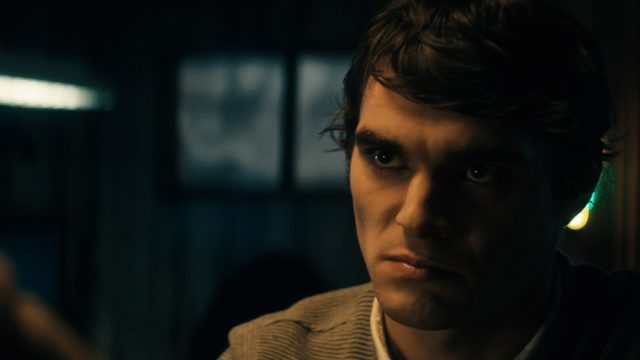In a strained effort to market this as a horror film, posters for Cody Calahan’s The Oak Room highlight a bloodstained handsaw, making the movie look like a classier, well, Saw. With hints of oak. Instead, while The Oak Room does have flare-ups of sudden and brutal violence, it’s not best represented by such an outright threat. This is a dark, wintry film where doom is a more of an undertow, invisible to the characters until the moment it catches them.
It’s also a nested series of “guy walks into a bar” stories. Bartender Paul (Peter Outerbridge) just wanted to close up for the night, but in walks his dead best friend’s son, the callow and slightly off-kilter Steve (RJ Mitte). Paul’s hackles are instantly up: Steve didn’t even show up for his dad’s funeral, so what the fuck is he doing here now? When Steve shrugs off Paul’s fury, Paul calls in reinforcements: Stelli, a hard-edged guy Steve owes a lot of money to. He’ll be there in about an hour, and in the meantime, Steve has a bizarre offer for Paul: let me pay what I owe you for my dad’s funeral by telling you a story. It happened just last week at The Oak Room, a bar not too far from here, and man, you won’t believe it.
Steve’s story concerns yet another bartender whose closing-up is interrupted by a man coming in out of a storm. Tension bubbles just under the surface, but Steve deliberately toys with it, providing a deflating ending and only then revealing that, as with so many “guy walks into a bar” jokes–this one, it turns out, very dark–he’s told it wrong. There’s something he needs to add, he says, for the story to make sense.
Before he can get to the rest of it, though, an irritated Paul tells some stories of his own, giving us further context for both the film’s existentialist streak and for the complex resentment its two leads have for each other. The sense of dread mounts up, and the final moments, where Paul–now vibrating with tension–works out the ultimate meaning of Steve’s story, are pretty sublime. We don’t understand everything there, but we understand enough.
It can, however, be hard to get on The Oak Room‘s wavelength. It too obviously gets off on being withholding, and it exists on a somewhat awkward literary and cinematic cusp: it wants to be an art film, but it’s not quite sophisticated enough to pull it off. It’s an interesting, worthwhile film, but it’s hard to shake the feeling that it falls short of its own ambitions and tastes. But the almost purgatorial sense of futility and doom, and the sense that the world is full of incidents we can’t entirely decode (or at least not until it’s too late), does make this striking. Mitte is also especially good, giving Steve a strong sense of presence without over-interpreting him for us. Recommended if you want an odd, deliberately paced thriller with a dreamlike horror bent.
The Oak Room is streaming on Amazon Prime and Tubi.


